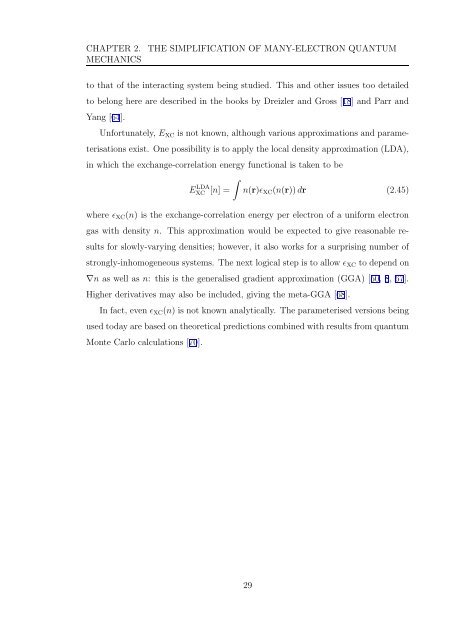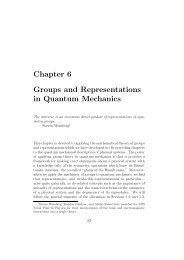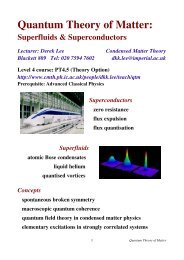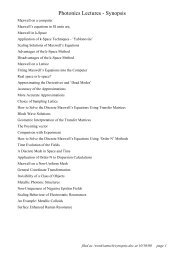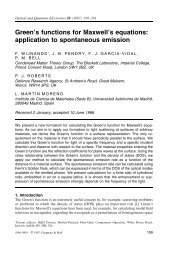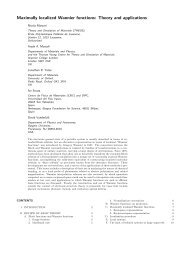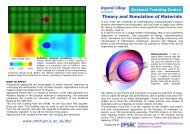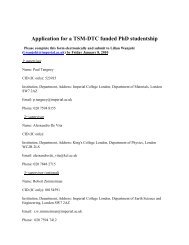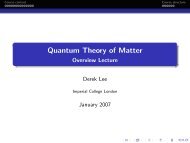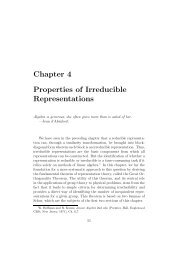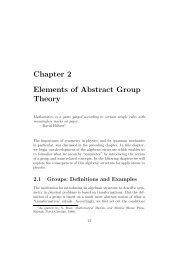- Page 1 and 2: Improving the accuracy of surface s
- Page 3 and 4: Acknowledgements I am greatly indeb
- Page 5 and 6: CONTENTS 3.3.4 Importance-sampled d
- Page 7 and 8: CONTENTS 10 Conclusions 181 A The q
- Page 9 and 10: LIST OF FIGURES 5.3 The LDA energy
- Page 11 and 12: LIST OF FIGURES 8.4 The x- and z-co
- Page 13 and 14: LIST OF FIGURES 8.20 Electron densi
- Page 15 and 16: List of Tables 8.1 The function F k
- Page 17 and 18: Chapter 1 Introduction In recent de
- Page 19 and 20: CHAPTER 1. INTRODUCTION A successfu
- Page 21 and 22: CHAPTER 2. MECHANICS THE SIMPLIFICA
- Page 23 and 24: CHAPTER 2. MECHANICS THE SIMPLIFICA
- Page 25 and 26: CHAPTER 2. MECHANICS THE SIMPLIFICA
- Page 27: CHAPTER 2. MECHANICS THE SIMPLIFICA
- Page 31 and 32: CHAPTER 3. QUANTUM MONTE CARLO METH
- Page 33 and 34: CHAPTER 3. QUANTUM MONTE CARLO METH
- Page 35 and 36: CHAPTER 3. QUANTUM MONTE CARLO METH
- Page 37 and 38: CHAPTER 3. QUANTUM MONTE CARLO METH
- Page 39 and 40: CHAPTER 3. QUANTUM MONTE CARLO METH
- Page 41 and 42: CHAPTER 3. QUANTUM MONTE CARLO METH
- Page 43 and 44: CHAPTER 3. QUANTUM MONTE CARLO METH
- Page 45 and 46: CHAPTER 3. QUANTUM MONTE CARLO METH
- Page 47 and 48: CHAPTER 3. QUANTUM MONTE CARLO METH
- Page 49 and 50: CHAPTER 3. QUANTUM MONTE CARLO METH
- Page 51 and 52: CHAPTER 3. QUANTUM MONTE CARLO METH
- Page 53 and 54: CHAPTER 3. QUANTUM MONTE CARLO METH
- Page 55 and 56: CHAPTER 3. QUANTUM MONTE CARLO METH
- Page 57 and 58: Chapter 4 Errors in QMC simulations
- Page 59 and 60: CHAPTER 4. ERRORS IN QMC SIMULATION
- Page 61 and 62: CHAPTER 4. ERRORS IN QMC SIMULATION
- Page 63 and 64: CHAPTER 4. ERRORS IN QMC SIMULATION
- Page 65 and 66: CHAPTER 4. ERRORS IN QMC SIMULATION
- Page 67 and 68: CHAPTER 4. ERRORS IN QMC SIMULATION
- Page 69 and 70: CHAPTER 4. ERRORS IN QMC SIMULATION
- Page 71 and 72: CHAPTER 5. THE JELLIUM SLAB The jel
- Page 73 and 74: CHAPTER 5. THE JELLIUM SLAB 0.08 0.
- Page 75 and 76: CHAPTER 5. THE JELLIUM SLAB The DMC
- Page 77 and 78: CHAPTER 5. THE JELLIUM SLAB -9.125
- Page 79 and 80:
CHAPTER 5. THE JELLIUM SLAB -0.3 Su
- Page 81 and 82:
CHAPTER 5. THE JELLIUM SLAB 0.14 be
- Page 83 and 84:
CHAPTER 5. THE JELLIUM SLAB At the
- Page 85 and 86:
CHAPTER 6. THE MODIFIED PERIODIC CO
- Page 87 and 88:
CHAPTER 6. THE MODIFIED PERIODIC CO
- Page 89 and 90:
CHAPTER 6. THE MODIFIED PERIODIC CO
- Page 91 and 92:
CHAPTER 6. THE MODIFIED PERIODIC CO
- Page 93 and 94:
CHAPTER 6. THE MODIFIED PERIODIC CO
- Page 95 and 96:
CHAPTER 6. THE MODIFIED PERIODIC CO
- Page 97 and 98:
CHAPTER 6. THE MODIFIED PERIODIC CO
- Page 99 and 100:
CHAPTER 6. THE MODIFIED PERIODIC CO
- Page 101 and 102:
CHAPTER 6. THE MODIFIED PERIODIC CO
- Page 103 and 104:
CHAPTER 6. THE MODIFIED PERIODIC CO
- Page 105 and 106:
CHAPTER 6. THE MODIFIED PERIODIC CO
- Page 107 and 108:
CHAPTER 7. THE ELECTRONIC GROUND-ST
- Page 109 and 110:
CHAPTER 7. THE ELECTRONIC GROUND-ST
- Page 111 and 112:
CHAPTER 7. THE ELECTRONIC GROUND-ST
- Page 113 and 114:
CHAPTER 7. THE ELECTRONIC GROUND-ST
- Page 115 and 116:
CHAPTER 7. THE ELECTRONIC GROUND-ST
- Page 117 and 118:
CHAPTER 7. THE ELECTRONIC GROUND-ST
- Page 119 and 120:
CHAPTER 7. THE ELECTRONIC GROUND-ST
- Page 121 and 122:
CHAPTER 8. APPLYING THE PLASMON NOR
- Page 123 and 124:
CHAPTER 8. APPLYING THE PLASMON NOR
- Page 125 and 126:
CHAPTER 8. APPLYING THE PLASMON NOR
- Page 127 and 128:
CHAPTER 8. APPLYING THE PLASMON NOR
- Page 129 and 130:
CHAPTER 8. APPLYING THE PLASMON NOR
- Page 131 and 132:
CHAPTER 8. APPLYING THE PLASMON NOR
- Page 133 and 134:
CHAPTER 8. APPLYING THE PLASMON NOR
- Page 135 and 136:
CHAPTER 8. APPLYING THE PLASMON NOR
- Page 137 and 138:
CHAPTER 8. APPLYING THE PLASMON NOR
- Page 139 and 140:
CHAPTER 8. APPLYING THE PLASMON NOR
- Page 141 and 142:
CHAPTER 8. APPLYING THE PLASMON NOR
- Page 143 and 144:
CHAPTER 8. APPLYING THE PLASMON NOR
- Page 145 and 146:
CHAPTER 8. APPLYING THE PLASMON NOR
- Page 147 and 148:
CHAPTER 8. APPLYING THE PLASMON NOR
- Page 149 and 150:
CHAPTER 8. APPLYING THE PLASMON NOR
- Page 151 and 152:
CHAPTER 8. APPLYING THE PLASMON NOR
- Page 153 and 154:
CHAPTER 8. APPLYING THE PLASMON NOR
- Page 155 and 156:
CHAPTER 8. APPLYING THE PLASMON NOR
- Page 157 and 158:
CHAPTER 8. APPLYING THE PLASMON NOR
- Page 159 and 160:
CHAPTER 8. APPLYING THE PLASMON NOR
- Page 161 and 162:
CHAPTER 8. APPLYING THE PLASMON NOR
- Page 163 and 164:
CHAPTER 8. APPLYING THE PLASMON NOR
- Page 165 and 166:
CHAPTER 8. APPLYING THE PLASMON NOR
- Page 167 and 168:
CHAPTER 9. ENERGY A NEW CALCULATION
- Page 169 and 170:
CHAPTER 9. ENERGY A NEW CALCULATION
- Page 171 and 172:
CHAPTER 9. ENERGY A NEW CALCULATION
- Page 173 and 174:
CHAPTER 9. ENERGY A NEW CALCULATION
- Page 175 and 176:
CHAPTER 9. ENERGY A NEW CALCULATION
- Page 177 and 178:
CHAPTER 9. ENERGY A NEW CALCULATION
- Page 179 and 180:
CHAPTER 9. ENERGY A NEW CALCULATION
- Page 181 and 182:
Chapter 10 Conclusions The original
- Page 183 and 184:
CHAPTER 10. CONCLUSIONS pling and o
- Page 185 and 186:
APPENDIX A. THE QUASI-2D EWALD SUM
- Page 187 and 188:
APPENDIX A. THE QUASI-2D EWALD SUM
- Page 189 and 190:
APPENDIX A. THE QUASI-2D EWALD SUM
- Page 191 and 192:
APPENDIX A. THE QUASI-2D EWALD SUM
- Page 193 and 194:
APPENDIX B. THE CUSP CONDITIONS may
- Page 195 and 196:
APPENDIX B. THE CUSP CONDITIONS wit
- Page 197 and 198:
APPENDIX C. INTEGRATING THE CUSP FU
- Page 199 and 200:
APPENDIX C. INTEGRATING THE CUSP FU
- Page 201 and 202:
APPENDIX D. RECONSTRUCTING A PROBAB
- Page 203 and 204:
APPENDIX D. RECONSTRUCTING A PROBAB
- Page 205 and 206:
APPENDIX D. RECONSTRUCTING A PROBAB
- Page 207 and 208:
Bibliography [1] P. H. Acioli and D
- Page 209 and 210:
BIBLIOGRAPHY [19] A. G. Eguiluz and
- Page 211 and 212:
BIBLIOGRAPHY [39] P. R. C. Kent, R.
- Page 213 and 214:
BIBLIOGRAPHY [59] H. J. Monkhorst a
- Page 215:
BIBLIOGRAPHY [80] C. J. Umrigar, K.


